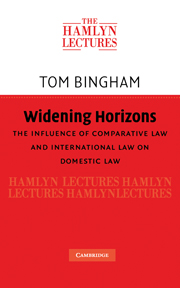2 - ‘Wider still and wider’
Published online by Cambridge University Press: 05 October 2014
Summary
The theme of this volume, a little inconsistently perhaps with Miss Hamlyn’s patriotic vision, is that British judges, sitting in British courts today, to an extent which she could scarcely have imagined, take note of and apply laws which are not indigenous to the United Kingdom, whose provenance is elsewhere. In the first chapter I discussed some cases – of course, a small minority of all cases decided – in which courts called on to resolve vexatious problems here were assisted towards a solution by consideration of the reasoning of foreign courts faced with the same problems. In this chapter I seek to address, necessarily briefly, the impact of international law on the work of the British courts.
It seems unlikely that international law loomed large in the consciousness of the Common People whom Miss Hamlyn wished her lectures to address, or for that matter in her own. Indeed, at the time when she made her will, and later, there were those, distinguished lawyers among them, who argued that international law was no law at all. And of course it is true that international law lacks some of the features which we most closely associate with domestic legal process: a representative assembly to lay down the law, a compulsory process of adjudication and an effective means of enforcement. But despite, and in large part because of, the breathtaking technological advances which have taken place in the seventy years since Miss Hamlyn laid down her pen in June 1939, the world has shrunk. There were always, of course, problems such as piracy which could only be effectively addressed by different nations, acting in concert, according to rules internationally agreed. But the number of such problems has increased exponentially over the years. A recent book lists the main practice areas in which issues of international law may arise. They include aviation, commercial and intellectual property law, criminal law, employment and industrial relations law, environmental law, family and child law, human rights law, immigration and asylum law, immunities and privileges, international organisations, jurisdiction, law of the sea, treaties, warfare and weapons law. There are international courts and tribunals which have limited jurisdiction in these areas, notably the International Court of Justice but also bodies such as the World Trade Organization, the International Centre for the Settlement of Investment Disputes, various human rights adjudicative bodies and many more.
- Type
- Chapter
- Information
- Widening HorizonsThe Influence of Comparative Law and International Law on Domestic Law, pp. 29 - 54Publisher: Cambridge University PressPrint publication year: 2010



